Text
Blog Post #4 Intersectionality; Schmidt’s Funny, Flamboyant, and Sassy Personality
Media continues to improve upon the characters' representation because every viewer should have someone to relate to. New Girl shows a representation of race, class, and gender, which was mentioned in a previous blog post. Still, the producer Elizabeth Meriwether also incorporated representation of religion, body image, and identity. These are essential topics that should be covered in television shows because they are discussed every day. People should not be afraid to discuss these crucial conversations. Schmidt has the most representation throughout the show that many viewers can relate to.
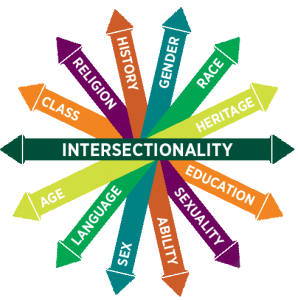
First, Schmidt is Jewish, so New Girl is continuously talking about religion because Schmidt loves his Jewish faith. Schmidt makes Jewish jokes throughout the show; he talks about how he loves matzo and his bat mitzvah. Mandy Berman writes, "His Jewishness, from the start of the show, is always prideful. He peppers his language with Yiddish, posts a heavily edited video of himself on his JDate profile, and proclaims an unabashed love for kosher yogurt. Any time there's a less-than-complimentary allusion towards his Jewishness, he's quick to call it out". Schmidt never fails to defend himself and enjoys his Jewish upbringing. In one episode called "Santa," the first scene shown is Schmidt decorating the loft for Christmas. Nick, Jess, and Winston discuss Christmas as a kid, and Schmidt chimes in and says how it was terrible for his reputation to tell kids Santa is not real. Schmidt may joke about being Jewish during Christmas; however, Jewish characters could relate when they were younger, keeping Santa a secret from children who celebrate Christmas. Schmidt mentions his Jewish religion many times throughout New Girl because he wants to make it known he is Jewish and normalizes being a different religion from his friends. Nick, Winston, and Jess never seem to make fun of his religion, but they may joke in response if he makes a joke.

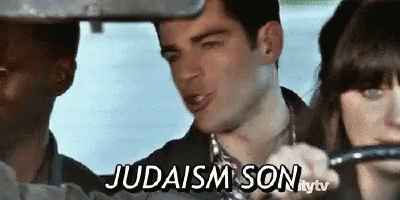
Second, Schmidt grew up as the "fat kid," and he did not have many friends growing up. So during episodes, Schmidt will discuss his past as being the "fat kid." Most of the time, he makes jokes about being fat and self-deprecating himself because he never wants to be at that stage of life again. In the show, his character is thin and dresses nice, so he mentions how he worked hard for his lifestyle and did not want to be fat. This is why he is a womanizer; he thinks that girls did not like him because he was overweight, so when he changed his lifestyle and became skinny, girls were more attracted to him. Now he sleeps around with women and treats women as objects because he believes he is superior to them. For some reason, being fat is a negative aspect of the show; he continues to make fun of himself when the show should have spoken positively about his life changes instead. Steve Sohn writes, "Thus, the mass media produces unrealistic images of the ideal body shape while sending out a false impression of how real and attainable these body shapes are. As a result, the media affects our own body perception and satisfaction through constant depictions of extremely attractive individuals. In other words, media depictions of such ideal body shapes increase the distance between our actual self-perception and our ideal self" (20). Viewers watching may find it funny, but it would be hard to relate for someone going through that struggle because he only talks about how great looking he is and how he never wants to go back to being fat. Landford Beard writes, "Greenfield said that Schmidt's weight loss "has a lot to do with who he is today" — for better or worse. "He thinks he's a different person now, but he's not. I think he was far more lovable and likeable when he was a little bit bigger. Now that he's lost the weight… he thinks he has to act a certain way. It doesn't always come off the best." Schmidt's whole attitude changed when he became skinny, and yes, the jokes may be funny, but he turned into someone who would bully him when he was younger. So, New Girl could have done a better job at representing body image more positively; however, that is Schmidt's character, and that's how he copes with it.
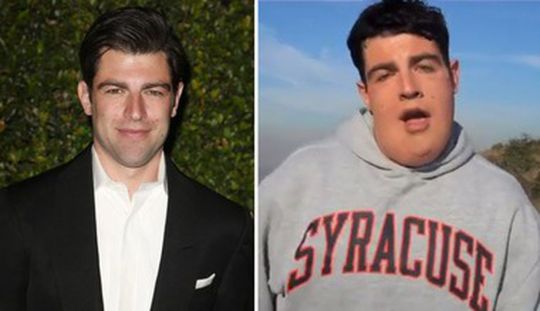
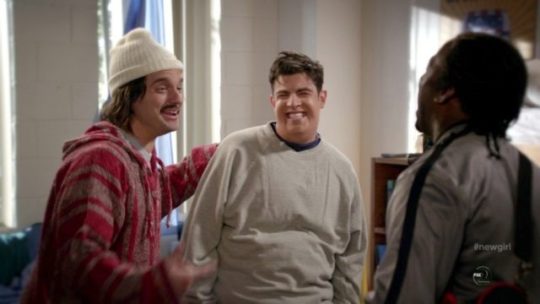
Third, Schmidt makes a new definition of identity. In the show, Schmidt is a straight guy and goes after so many women. But, Schmidt is very flamboyant and likes nice things, so viewers may think Schmidt is gay or bisexual, but he sleeps around with many women; he redefines the stereotypical role of a womanizer. Most womanizers in sitcoms like Two and a Half Men drink all day and do not have a job, but Schmidt has a good job and only goes out on the weekends with Nick, Winston, Cece, and Jess; he enjoys buying lavish things. He comes across as very OCD, and in many episodes, he is controlling the situation by doing extra cleaning or cooking. New Girl does an excellent job at representing identity because Schmidt is a character that does it all, and viewers can relate a lot to Schmidt. He is a funny character trying to discover himself, what he enjoys in life, and controlling his friends. Schmidt is a character everyone can relate to because he is Jewish; he was the "fat kid," he overcomes body image issues and is successful in his career. He is stubborn and can be insulting overall; he means well and can be a character people look at positively. Schmidt wants to be the best and strives for it, which is very successful.
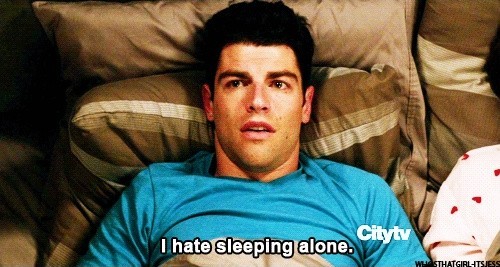
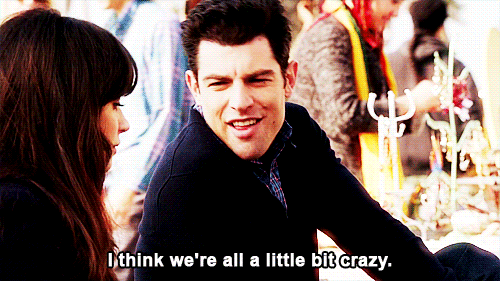
Clip of “Santa” https://www.youtube.com/watch?v=ZdWWHcz81k8
Best of Schmidt clip https://www.youtube.com/watch?v=uORhtyr1giw
Citations:
Beard, Landford. “'New Girl': Max Greenfield talks Fat Schmidt flashbacks”. 21 Febuary, 2012. Entertainment https://ew.com/article/2012/02/21/new-girl-fat-schmidt-max-greenfield/.
Berman, Mandy. “An Ode to Schmidt, New Girl’s Revolutionary Jewish Character”. 15 May, 2018. Alma https://www.heyalma.com/ode-schmidt-new-girls-revolutionary-jewish-character/.
Sohn, SteveH. “Body Image: Impacts of Media Channels on Men’s and Women’s Social Comparison Process, and Testing of Involvement Measurement.” Atlantic Journal of Communication, vol. 17, no. 1, Jan. 2009, pp. 19–35. EBSCOhost, doi:10.1080/15456870802505670.
2 notes
·
View notes
Text
Blog #3: Class Representation Are the characters in New Girl living a realistic lifestyle?
Class representation in the media is never portrayed correctly because media platforms are trying to live up to the “American Dream.” The American Dream is the perfect family who lives in the suburbs with a mom, dad, and two children. The father usually works, while the mother stays at home. The American Dream has changed over the years, but still, it is not portrayed well in television shows. Even shows like New Girl class are misrepresented because Jess, Schmidt, Nick, and Winston, live in a lovely loft in California, and most of them do not have high paying jobs. The loft they live in them probably would never be able to afford real life because California is expensive. Friends and many other shows are similar because they have meager paying jobs or are in and out of work but live lavishly. Kristie Bunton reviewed an essay about class representation writing, “Thirty years after The Jeffersons aired on CBS, we made Friends on NBC with characters whose jobs as a museum paleontologist turned professor, an often-unemployed actor, a masseuse, a restaurant cook, and a waitress turned retail worker could never have afforded them the upscale possessions they flaunted” (360). Her thoughts and reviews replicate New Girl because they live in a nice place but do not have high paying jobs.

(The loft)
The characters in the show usually all have jobs. Sometimes they are out of work for a short period, but they make some money most of the time. Jess is a teacher, and she loves her job and always wants to be working. At one point in the show, she loses her job, and she becomes very upset about it; she then applies to many jobs and ends up finding another. As the play progresses, she becomes the principal of one of the schools, so she makes her way up in the working world. Nick is a bartender, he does not care to succeed at the beginning of the show, and when he was in college, he was studying to be a lawyer, but then got lazy and stopped studying. “Though Nick didn’t shed every negative trait, he did end up maturing (very slowly) over the course of the series. Early Nick Miller doesn’t have a bank account and is all-around terrible with money” (Bajgrowicz). Nick does not care about things and has some money scares throughout the show. However, he becomes more of an adult and becomes a successful author, which he loves very much. Schmidt is the most successful out of everyone in the loft; he works in marketing. Adrienne Tyler writes, “Schmidt was also the only one in the group with a steady job, and thus the one everyone relied on when it came to money and paying the rent” (Screenrant). Schmidt likes to live a very lavish lifestyle, buying custom suits, and eating excellent food. Schmidt always is making fun of his friends and makes it known he makes the most money. Schmidt sometimes has to help Nick out with cash because of his money scares. Last is Winston, he was a professional basketball player in Europe, but he tries to find a passion when he comes back. He has trouble finding a stable job but then takes the police exam and becomes a LAPD member. This is a big turning point for Winston because he finally finds something he loves to do, and many people did not believe in him.




New Girl does a good job of representing the different characters struggling with money because people struggle with money in real life. So, as a young viewer of the show, seeing the struggle characters can have when they lose a job or can not find their passion is relatable. Mostly college students who are still trying to figure out what they want to do can relate to Nick or Winston. In contrast, they could do a better job of making these characters' lives more realistic. Nick would not be able to afford a big loft-like, the one they have if he was only a bartender. Schmidt spends a lot of money on his lavish lifestyle, and the amount of money he spends does not add up to how much he would make. So it is essential in these shows to make the characters more realistic; however, it can be relatable for viewers.
https://www.youtube.com/watch?v=tAa6Ex20XDU (Nick talking about money)
https://www.youtube.com/watch?v=LkgS0NLUEEE (Schmidt and Jess get promoted)
Citations:
Bajgrowicz, Brooke. “5 Ways Nick Changed Throughout The Series (& 5 Ways He Stayed The Same)”. 8 June, 2020. Screenrant. https://screenrant.com/new-girl-ways-nick-miller-changed-stayed-same/
Bunton, Kristie, and Stephen J. A. Ward. “Framing Class: Media Representations of Wealth and Poverty in America / Class and News / Class Dismissed: How TV Frames the Working Class.” Journal of Mass Media Ethics, vol. 21, no. 4, Dec. 2006, pp. 359–371. EBSCOhost, doi:10.1207/s15327728jmme2104_10.
Tyler, Adrienne. “New Girl: What Schmidt's Job Is (& How Much He Earns)”. 19 August, 2020. Screenrant. https://screenrant.com/new-girl-schmidt-job-role-salary-money-explained/
0 notes
Text
Blog Post #2: Media’s Underrepresentation of Female Characters; Jessica Day making her voice heard in New Girl
Gender representation in media is significant, especially for young children watching shows because they grow up and expect what they see in real life. Gender representation for females is significantly underrepresented, and males dominate the screen. Miss representation a documentary about women in the media highlights the issues young women feel everyday, and women being underrepresented in media makes it hard or young people to relate. Young girls will have a more challenging time relating to characters because there are not many female characters to relate to. In most television shows or commercials, females are the stereotypical housewife or getting overshadowed by the men, so viewers only see women stereotypes represented. In a study done by Robert Bartsch and Teresa Burnett, they looked at gender representation in commercials. They compared it to research done in the ’70s, and ’80s and they hoped to see a change in commercials because women had not been represented to the extent they should be. They found that nothing had changed much, and women are still underrepresented in commercials. Bartsch and Burnett write, “The findings indicate that unequal gender representation is still present in television commercials. Females are overrepresented as product repre- sentatives for domestic products, and males are overrepresented as product representatives for nondomestic products. Interestingly, there is a trend of greater gender bias in product representatives for domestic products compared to commercials 10 years ago. It appears that commercials may have taken a step backwards in some areas from becoming gender neutral” (741). This study was conducted in 1998, and hopefully, since then, women are more represented.


Nowadays, women are better represented than five years ago. There are more shows with women as the lead, for example, New Girl, The Mindy Project, or a more recent one Emily in Paris. So, it is good to see women on the screen and playing a significant role; however, there are still aspects that are not represented correctly. New Girl does an excellent job at representing women the correct way, like having a voice to stand up to men or other women and being independent. Libby Allnatt writes, “The female characters have their fair share of conflict, but they confide in each other for support and don’t engage in the catty stereotype of female friendship”(State Press). Although there are some negative aspects because Jess and Cece get played by guys a lot, they always need a man in their life. Nick, Schmidt, and Winston are still talking about girls and sometimes degrading women and treating them as objects.
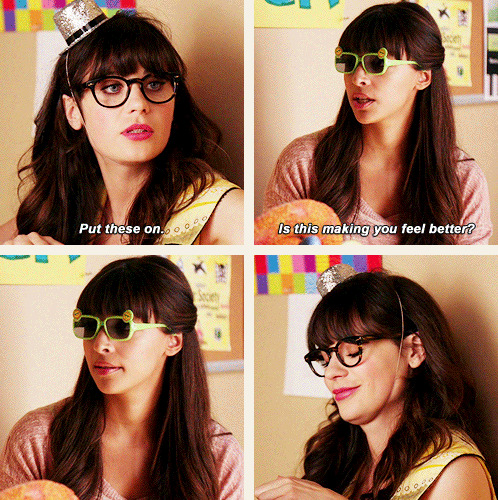
In one particular episode called “Jess and Julia,” Nick has a new girlfriend named Julia, and he likes her but does not want to label their relationship. Nick’s character gets around with many women, and the relationships usually last a few weeks, and nothing ever turns serious. So, when he is getting serious with Julia, he freaks out and calls her “the girl he is sleeping with” instead of his girlfriends. This is very degrading to women because he treats her as someone he sleeps with but does not want anything serious, objectifying to women. Julia’s character is a successful lawyer, so here New Girl does an excellent job at making her an independent woman who is very serious about her career. Julia helps Jess get out of a parking ticket, and Jess’s character is very flamboyant and artsy, which is the total opposite of Julia. Jess also likes to be involved in people's relationships because she does not want anyone to be upset. Jess gets involved in Julia and Nick's relationship, so Julia becomes mad at Jess and calls her artsy, and makes fun of the fact that she is a teacher. Later, Jess stands up for herself in the episode and tells Julia she should not judge her because of the way she is. This part of the episode was great because Jess is using her voice and standing up for herself. Julia later apologizes and does arts and crafts with Jess, Cece, and Jess’s other friend. New Girl tries to make women powerful in most episodes because women have a voice and should not be dominated by males. Navya Katragadda writes, “Jess is mostly able to make her own choices but it is also important to consider the fact that Jess cannot usually act on her desires sometimes”. Jess and Cece are very powerful women who say how they feel and do not let the men take them down.

https://www.youtube.com/watch?v=1Apm-eaUNQY&list=FLzuWqNb1pZrETjdiS7Xgb_g&index=46 (Clip of Jess standing up for herself)
In contrast, the show does have parts where the men are rude to women. Schmidt is always meeting new girls and sleeping with them, then does not call them back. He can be very degrading, and Nick does the same thing. However, even when they are degrading, Jess, or Cece speaks their mind and explains how they can not do that. So, overall, New Girl represents gender well, which is different from shows that have come up even in recent years.

Citations:
Allnatt, Libby. “New Girl is a feminist win.” 23 October, 2016. The State Press. https://www.statepress.com/article/2016/10/new-girl-feminist-women-in-comedy-zooey-deschanel-gender-race-sexuality
Bartsch, Robert A., et al. “Gender Representation in Television Commercials: Updating an Update.” Sex Roles, vol. 43, no. 9–10, Nov. 2000, pp. 735–743. EBSCOhost, doi:10.1023/A:1007112826569.
Katragadda, Navya. “Gender Representation in New Girl”. 3 November, 2018.
https://sites.gatech.edu/1102tvfem/2018/11/03/gender-representation-in-new-girl/
0 notes
Text
Blog Post #1: Race Representation in New Girl Exploring Winston’s “blackness”
Race is not represented correctly across mass media; race is depicted incorrectly or isn't very respectful to that specific race. The show New Girl starring Zooey Deschanel is about Jess (Deschanel), a quirky single woman who moves into a loft with three guys. The show's main characters are Jess, Nick, Schmidt, Winston, and Cece, and the show is basically about their daily life and funny things that happen. New Girl incorporates race in the show, Winston is black, and Cece is Indian, the other characters are white. Interestingly, Winston was not on the first few episodes because they had another black character, Coach, who was on for a few episodes, then later left. When Coach's character left, they quickly replaced him with Winston.
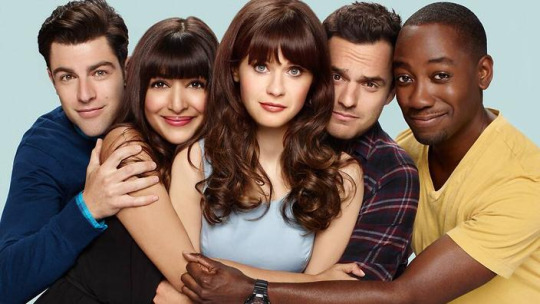
In one particular episode called “The Cabin,” the topic is about race. Schmidt notices Winston is talking with a few black people at the bar, and when Schmidt arrives, he asks Winston who his friends were, and Winston responds that he just met them. Schmidt was feeling bad for Winston because he thought he was hiding his ethnicity, so Schmidt took it upon himself to make Winston “more black.” Schmidt assumed he wanted to eat fried chicken and the stereotypical “black foods,” and Winston, the funny character he is, took Schmidt’s joking to the next level and told Schmidt he wanted crack cocaine. So, both Winston and Schmidt drive to the projects, and that is when Winston told Schmidt he was messing with him, and he is not upset with the way he embraces his “blackness,” and he does not want anything to change. Schmidt felt he and the rest of their friends were not treating Winston with respect, but Winston did not feel that way at all. “Some viewers accused this episode of allowing New Girl to “get away with racism,” but that’s completely missing the point. Just because a character (Schmidt) is racist doesn’t mean the entire show is promoting racism” ( Isabella Biedenharn). This episode was interesting because it highlighted the importance of not being quick to judge, and people need to ask their friends questions about race and not assume. In contrast, the show producers forced a race episode. They wanted to address the only black character because they had not. Winston’s character is funny; he likes to joke around, but he also was a former basketball player, so the show is stereotyping him as a big sports guy. “Admittedly, his involvement has gotten better over the course of two seasons, but the writers are still struggling to make him into an individual – the paragon of post-racial identity” (cldavisii). Winston's character is not always as involved as the other characters, which is why it seems the show keeps him around as the token character.
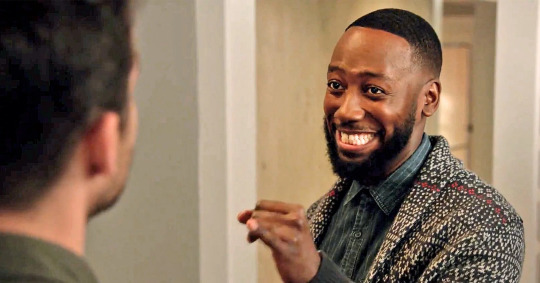
This show still needs progress compared to Friends; they are doing a lot better with incorporating diversity into their show. “In addition to Rhonda and Peter, we could create a long list of black characters on Friends who relate to the central six as either subordinate or superior. It would include, four of Chandler’s bosses, and Claudia, his subordinate in Oklahoma; Ross’s divorce lawyer; the librarian at the University where Ross is employed; at least two waiters; a theater director whom Phoebe convinces that Joey has learning difficulties; Rachel and Phoebe’s self-defense trainer; Phoebe’s boss at the toner supply warehouse; the nurse who brings Rachel’s baby for a feeding in the hospital, and the guy who sells the armadillo costume to Ross (among several others)” (Cobb 712). Friends have not debuted minority characters, so it is important to note that shows have been doing a better job, but there is room for improvement.
Citations
Biedenharn, Isabella. “How Winston and Coach Help ‘New Girl’ Subvert Racial Stereotypes.” 11 February 2014, https://www.flavorwire.com/436995/how-winston-and-coach-help-new-girl-subvert-racial-stereotypes. Accessed 3 November 2020.
Cobb, Shelley. ““I’d Like Y’all to Get a Black Friend”: The Politics of Race in Friends.” Sage Journal. https://journals.sagepub.com/doi/pdf/10.1177/1527476418778420.
“Is Winston (of ‘The New Girl’) the model post-racial roommate?” 24 March 2013, https://raceandarchitecture.com/2013/03/24/is-winston-of-the-new-girl-the-model-post-racial-roommate/. Accessed 3 November 2020.
1 note
·
View note